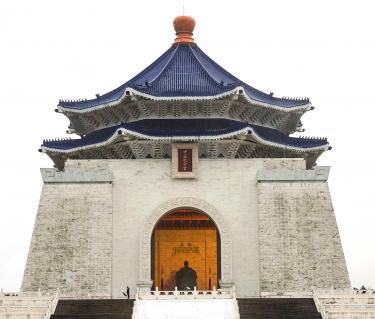The Ministry of Culture yesterday said it is working on a bill to reinvent the Chiang Kai-shek (蔣介石) Memorial Hall, which, if passed, would see the Taipei landmark renamed and most, if not all, of the authoritarian symbols associated with Chiang removed.
“We all know that the Chiang Kai-shek Memorial Hall was built during the nation’s authoritarian era to commemorate a dictator,” Minister of Culture Cheng Li-chiun (鄭麗君) told a Taipei news conference to outline the ministry’s work to promote transitional justice.
“This year marks the 70th anniversary of the 228 Incident and the 30th anniversary of the lifting of martial law. In order to come to terms with history and the damage done, and to pay respect to human rights, we believe that it is necessary to reinvent the Chiang Kai-shek Memorial Hall,” she said.
The ministry is working on a draft amendment to the Organization Act of National Chiang Kai-shek Memorial Management Office (國立中正紀念堂管理處組織法), which is to be reviewed by the Cabinet and the legislature, she said, adding that the ministry hopes the draft can be passed into law within the next six months, during the upcoming legislative session.
The ministry this month pulled merchandise bearing Chiang’s portraits — including figurines, stationery and accessories — from souvenir stores in the building, Cheng said.
The merchandise can still be bought elsewhere, but it would no longer be manufactured, Cheng said.
The ministry has restored the names of exhibition halls and performance venues that were later named after Chiang and his relatives, because the original titles were more generic and thus are not viewed as authoritarian symbols, she said.
For example, the Jie Shi Exhibition Hall, whose title adopted an alternative version of Chiang’s name, was seen yesterday to have regained its original title: “The Second Exhibition Hall.”
Broadcasts of the Chiang Kai-shek Memorial Song — played twice a day as the hall opens and closes — are to be replaced by announcements informing visitors of the facility’s opening hours, Cheng said.
The ministry this month assembled a panel of experts and academics to assess its plans to repurpose the edifice and gather public opinion on the issue, she said.
In response to media queries over whether the building would be renamed the Taiwan Democracy Memorial Hall, a name proposed by the Ministry of Education in 2007, Cheng said the title is being considered by the ministry, adding that the act must be amended before the building’s name can be officially changed.
She reiterated the necessity of amending the act when asked whether exhibits and artifacts associated with Chiang would be removed from the building, as the act stipulates that work to archive and maintain artifacts related to Chiang be performed by the National Chiang Kai-shek Memorial Hall Management Office.
Asked whether statues and busts of Chiang would be removed and the daily ceremony of military police changing shifts stopped, Cheng said the issues would be decided after consulting public opinion.
The ministry seeks to transform the building into a facility promoting art and culture, she said.
Northern Taiwan Society chairman Chang Yeh-shen (張葉森) yesterday lauded the ministry’s proposal as “belated justice,” adding that without taking the step of tackling the issues concerning the memorial hall, any talk of implementing transitional justice is worthless.
Source: Taipei Times - 2017/02/26





















